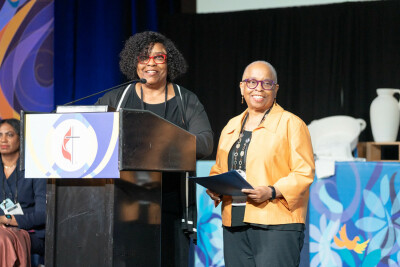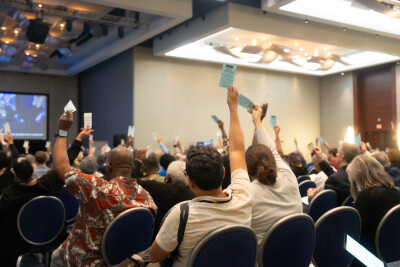Vote taken on 2025 Constitutional Amendments
By Erik Alsgaard
If at first you don’t succeed, the old saying goes, try and try again.
On May 14, members of the Baltimore-Washington Conference joined United Methodists from across the globe in voting on four proposed amendments to the church’s constitution. These amendments were approved last May at the 2020/2024 General Conference. In order to take effect in the church, two-thirds of the aggregate vote on each amendment from every annual conference needs to be achieved. Thus, every vote counts, even though the vote results won’t be known until November.
The last time the United Methodist church’s constitution was amended was in 2018, when three amendments were adopted by the required two-thirds approval. Two other amendments did not pass, one failing by only 35 votes.
 The Rev. Ianther Mills and Cynthia Taylor, chairs of the BWC delegation to that 2020/2024 General Conference, presented the 2025 proposed amendments. “We have journeyed together for six years,” Mills said, noting that the delegation was elected in 2019.
The Rev. Ianther Mills and Cynthia Taylor, chairs of the BWC delegation to that 2020/2024 General Conference, presented the 2025 proposed amendments. “We have journeyed together for six years,” Mills said, noting that the delegation was elected in 2019.
Amendment One calls for regionalization through a package of legislation that gives The United Methodist Church’s geographic regions equal decision-making authority.
Under regionalization, the U.S. and each central conference — church regions in Africa, Europe and the Philippines — would become regional conferences with the same authority to adapt parts of the Book of Discipline, the denomination’s policy book, for more missional effectiveness. Just as is now the case in the U.S. and each central conference, each regional conference would consist of multiple annual conferences.
“Regionalization would allow for effective ministry in every culture,” Mills said. “The needs of those around us are different. Our cultures are special. With regionalization in place, we can better minister to those around us.”
At present, only central conferences have authority under the denomination’s constitution to adapt the Discipline as missional needs and different legal contexts require. The constitutional amendments not only extend that same authority to the U.S. but also spell out what can be adapted.
The second amendment members voted on deals with inclusion in church membership. If adopted, this amendment would add “gender” and “ability” to the list of characteristics that do not bar people from membership in a United Methodist church. In short, this constitutional amendment means pastors may not deny a person church membership whether that person is male or female or has a disability.
Amendment three seeks to completely revise the constitution’s Paragraph 5, Article V, to strengthen the denomination’s longtime stance for racial justice.
 During debate on this amendment, the Rev. Selena Johnson, who serves Mount Zion UMC in Washington, D.C., said, “It is so very refreshing, that the United Methodist Church - amidst this present darkness, is poised to make their declaration against racism even stronger.”
During debate on this amendment, the Rev. Selena Johnson, who serves Mount Zion UMC in Washington, D.C., said, “It is so very refreshing, that the United Methodist Church - amidst this present darkness, is poised to make their declaration against racism even stronger.”
Johnson said that she and her fellow Black clergywomen stood in support of this amendment. “We are not battling against flesh and blood,” she said. “We are not condemning any group of people, but we are standing against powers and principalities and spiritual wickedness in high places.”
Roger Kuhn, lay member from Woodbine: Morgan Chapel UMC, spoke against the amendment, noting that the current language was adequate and not in need of change.
The Rev. Giovanni Arroyo, who serves as General Secretary of the General Commission on Religion and Race, asked the body, “What kind of church are we called to be?” Do we acknowledge that racism is wrong, he added, or one that actively works to eliminate it. “This article is about what it means to help change lives,” he said. “Inclusion is central to who we are.”
The fourth amendment aims to clarify who can elect the clergy delegates who serve at General Conference, and also at U.S. jurisdictional and central conferences, which elect bishops.
Read more about the four constitutional amendments.
